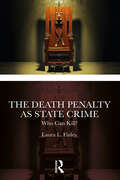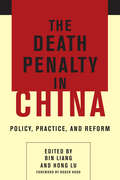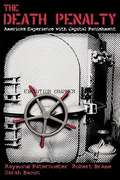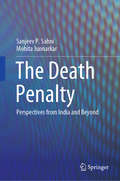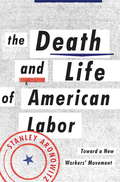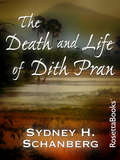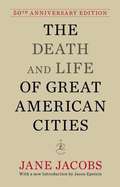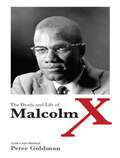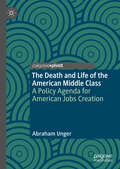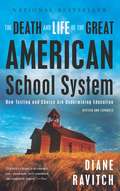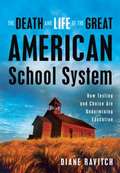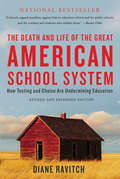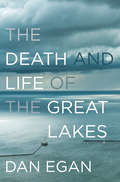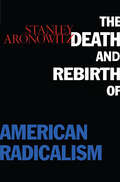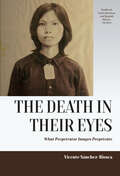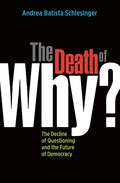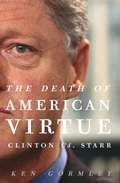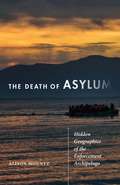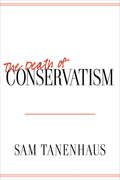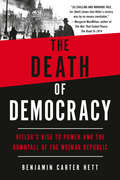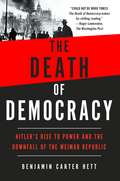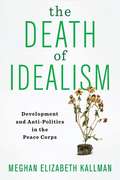- Table View
- List View
The Death Penalty as State Crime: Who Can Kill?
by Laura L. FinleyThis book offers a new perspective on the death penalty in the US, examining capital punishment as state crime or state-produced harm. It addresses the death penalty, showing how the state not only authorizes a system and a practice that tortures human beings, but is also aware of its deep flaws and chooses not to address them.Building on the vast literature on state crime together with case examples and interviews with activists seeking to abolish the death penalty, this book offers a new and innovative critique of state punishment in the US. It draws on a range of issues and topics such as arbitrariness, inadequate counsel, racial bias, mental illness, innocence, conditions on death row, the protocols, and the equipment used for executions. It emphasizes the need for abolition of the death penalty and highlights efforts being made to do so, with a focus on successful elements of abolition campaigns.The Death Penalty as State Crime is essential reading for all those engaged with capital punishment, human rights, and state crime, and will be of interest to criminologists, sociologists, legal scholars and political scientists alike.
The Death Penalty in China
by Hong Lu Roger Hood Bin LiangChina currently leads the world in death sentences and executions, making it a primary target for the global abolition movement. While the results have been subtle, anti-death penalty advocates are beginning to influence Chinese attitudes toward the practice, as well as law. Conducting an interdisciplinary and comparative study of China's death penalty as the country heads toward reform, this book explains what it took to advance reforms to limit death sentences and executions, while identifying the challenges that prevent more extensive progress. Featuring experts from Europe, Australia, Japan, China, and the United States, this collection follows changes in the theory and policy of China's death penalty from the Mao era (1949-1979) through the Deng era (1980-1997) up to the present day. Using empirical data, such as capital offender and offense profiles, temporal and regional variations in capital punishment, and the impact of social media on public opinion and reform, contributors relay both the particular character of China's death penalty practices and the incremental changes that indicate reform. They then compare the Chinese experience to other countries throughout Asia and the world, showing how change can be implemented even within a non-democratic and rigid political system, but also the dangers of pushing policies that society may not be ready to embrace.
The Death Penalty in China: Policy, Practice, and Reform
by Lu Liang Bin HongFeaturing experts from Europe, Australia, Japan, China, and the United States, this collection of essays follows changes in the theory and policy of China's death penalty from the Mao era (1949–1979) through the Deng era (1980–1997) up to the present day. Using empirical data, such as capital offender and offense profiles, temporal and regional variations in capital punishment, and the impact of social media on public opinion and reform, contributors relay both the character of China's death penalty practices and the incremental changes that indicate reform. They then compare the Chinese experience to other countries throughout Asia and the world, showing how change can be implemented even within a non-democratic and rigid political system, but also the dangers of promoting policies that society may not be ready to embrace.
The Death Penalty: America's Experience with Capital Punishment
by Raymond Paternoster Robert Brame Sarah BaconThe authors present a balanced perspective that focuses on both the arguments for and against capital punishment--one of the most controversial issues in the criminal justice system today.
The Death Penalty: Perspectives from India and Beyond
by Mohita Junnarkar Sanjeev P. SahniThis book offers a broad overview of public attitudes to the death penalty in India. It examines in detail the progress made by international organizations worldwide in their efforts to abolish the death penalty and provides statistics from various countries that have already abolished it. The book focuses on four main aspects: the excessive cost and poor use of funds; wrongful executions of innocent people; the death penalty’s failure as an efficient deterrent; and the alternative sentence of life imprisonment without parole. In closing, the book analyses the current debates on capital punishment around the globe and in the Indian context. Based on public opinion surveys, the book is essential reading for all those interested in India, its government, criminal justice system, and policies on the death penalty and human rights.
The Death and Life of American Labor
by Stanley AronowitzUnion membership in the United States has fallen below 11 percent, the lowest rate since before the New Deal. Labor activist and scholar of the American labor movement Stanley Aronowitz argues that the movement as we have known it for the last 100 years is effectively dead. And he explains how this death has been a long time coming--the organizing and political principles adopted by U.S. unions at mid-century have taken a terrible toll. In the 1950s, Aronowitz was a factory metalworker.In the '50s and '60s, he directed organizing with the Amalgamated Clothing Workers and the Oil, Chemical and Atomic Workers. In 1963, he coordinated the labor participation for the March on Washington for Jobs and Freedom. Ten years later, the publication of his book False Promises: The Shaping of American Working Class Consciousness was a landmark in the study of the U.S. working-class and workers' movements.Aronowitz draws on this long personal history, reflecting on his continuing involvement in labor organizing, with groups such as the Professional Staff Congress of the City University. He brings a historian's understanding of American workers' struggles in taking the long view of the labor movement. Then, in a survey of current initiatives, strikes, organizations, and allies, Aronowitz analyzes the possibilities of labor's rebirth, and sets out a program for a new, broad, radical workers' movement.
The Death and Life of Dith Pran
by Sydney H. SchanbergThe US journalist&’s account of his colleague&’s struggle to survive the Cambodian genocide—the basis for the Oscar–winning film The Killing Fields. On April 17, 1975, Khmer Rouge soldiers seized Phnom Penh—the capital of Cambodia—and began a brutal genocide that left millions dead. Dith Pran, a Cambodian working as an assistant to American reporter Sydney H. Schanberg, was a witness to these events. While his employer managed to escape across the border, Dith Pran fled into the Cambodian countryside—and into the heart of the massacre. The basis for the acclaimed movie The Killing Fields, this is the compelling account of the days before the fall of Phnom Penh. It&’s the story of one man&’s struggle for survival in a country that had become a death camp for millions of its citizens—and another man&’s failed efforts to keep his friend and colleague safe. Written within a year of the atrocities committed by the Khmer Rouge, it is a work of both historical and literary significance. Sydney H. Schanberg contributed a moving new foreword to this first eBook edition.
The Death and Life of Great American Cities
by Jane JacobsThis special edition of Jane Jacobs's masterpiece, "The Death and Life of Great American Cities", features a new Introduction by Jason Epstein, the book's original editor, who provides an intimate perspective on Jacobs herself and unique insights into the creation and lasting influence of this classic.
The Death and Life of Malcolm X
by Peter GoldmanThe Death and Life of Malcolm X provides a dramatic portrait of one of the most important black leaders of the twentieth century. Focusing on Malcolm X's rise to prominence and the final year of his life, the book details his rift with the Nation of Islam and its leader, Elijah Muhammad, leading to death threats and eventually assassination at the hands of a death squad. In a new preface for this edition, Peter Goldman reflects on the forty years since the book's first publication and considers new information based on FBI surveillance that has since come to light.
The Death and Life of the American Middle Class: A Policy Agenda for American Jobs Creation
by Abraham UngerThis book addresses what is perhaps the most salient issue in American politics today: the decline of the middle class. It is this single issue that drove the outlier presidential candidates Bernie Sanders and Donald Trump to national prominence, and undergirded the electoral victory of Donald Trump. While there are other longer studies exploring in detail the structural forces, most prominently the loss of manufacturing in the US, that have caused the contraction of the middle class, none offer in shorter form practical policy solutions directly geared towards practitioners in government and the private sector. This work focuses specifically on combining both an academic analysis of the subject combined with detailed policy recommendations. These recommendations are designed to be implemented; they take into account the latest set of real world political variables such as actual current legislative and institutional agendas currently in play on the federal and local levels.
The Death and Life of the Great American School System
by Diane RavitchA passionate plea to preserve and renew public education, The Death and Life of the Great American School System is a radical change of heart from one of America's best-known education experts. Diane Ravitch--former assistant secretary of education and a leader in the drive to create a national curriculum--examines her career in education reform and repudiates positions that she once staunchly advocated. Drawing on over forty years of research and experience, Ravitch critiques today's most popular ideas for restructuring schools, including privatization, standardized testing, punitive accountability, and the feckless multiplication of charter schools. She shows conclusively why the business model is not an appropriate way to improve schools. Using examples from major cities like New York, Philadelphia, Chicago, Denver, and San Diego, Ravitch makes the case that public education today is in peril. Ravitch includes clear prescriptions for improving America's schools: leave decisions about schools to educators, not politicians or businessmen devise a truly national curriculum that sets out what children in every grade should be learning expect charter schools to educate the kids who need help the most, not to compete with public schools pay teachers a fair wage for their work, not "merit pay" based on deeply flawed and unreliable test scores encourage family involvement in education from an early age The Death and Life of the Great American School System is more than just an analysis of the state of play of the American education system. It is a must-read for any stakeholder in the future of American schooling.
The Death and Life of the Great American School System
by Diane RavitchA passionate plea to preserve and renew public education,The Death and Life of the Great American School Systemis a radical change of heart from one of America’s best-known education experts. Diane Ravitch-former assistant secretary of education and a leader in the drive to create a national curriculum-examines her career in education reform and repudiates positions that she once staunchly advocated. Drawing on over forty years of research and experience, Ravitch critiques today’s most popular ideas for restructuring schools, including privatization, standardized testing, punitive accountability, and the feckless multiplication of charter schools. She shows conclusively why the business model is not an appropriate way to improve schools. Using examples from major cities like New York, Philadelphia, Chicago, Denver, and San Diego, Ravitch makes the case that public education today is in peril. Ravitch includes clear prescriptions for improving America’s schools: leave decisions about schools to educators, not politicians or businessmen devise a truly national curriculum that sets out what children in every grade should belearning expect charter schools to educate the kids who need help the most, not to compete with public schools pay teachers a fair wage for their work, not “merit pay” based on deeply flawed and unreliable test scores encourage family involvement in education from an early age The Death and Life of the Great American School Systemis more than just an analysis of the state of play of the American education system. It is a must-read for any stakeholder in the future of American schooling.
The Death and Life of the Great American School System: How Testing and Choice Are Undermining Education
by Diane RavitchA passionate plea to preserve and renew public education, The Death and Life of the Great American School System is a radical change of heart from one of America’s best-known education experts. Diane Ravitch—former assistant secretary of education and a leader in the drive to create a national curriculum—examines her career in education reform and repudiates positions that she once staunchly advocated. Drawing on over forty years of research and experience, Ravitch critiques today’s most popular ideas for restructuring schools, including privatization, standardized testing, punitive accountability, and the feckless multiplication of charter schools. She shows conclusively why the business model is not an appropriate way to improve schools. Using examples from major cities like New York, Philadelphia, Chicago, Denver, and San Diego, Ravitch makes the case that public education today is in peril. Ravitch includes clear prescriptions for improving America’s schools:leave decisions about schools to educators, not politicians or businessmendevise a truly national curriculum that sets out what children in every grade should be learningexpect charter schools to educate the kids who need help the most, not to compete with public schoolspay teachers a fair wage for their work, not “merit pay” based on deeply flawed and unreliable test scoresencourage family involvement in education from an early ageThe Death and Life of the Great American School System is more than just an analysis of the state of play of the American education system. It is a must-read for any stakeholder in the future of American schooling.
The Death and Life of the Great Lakes
by Dan Egan<P>A landmark work of science, history and reporting on the past, present and imperiled future of the Great Lakes. <P>The Great Lakes—Erie, Huron, Michigan, Ontario and Superior—hold 20 percent of the world’s supply of surface fresh water and provide sustenance, work and recreation for tens of millions of Americans. But they are under threat as never before, and their problems are spreading across the continent. <P>The Death and Life of the Great Lakes is prize-winning reporter Dan Egan’s compulsively readable portrait of an ecological catastrophe happening right before our eyes, blending the epic story of the lakes with an examination of the perils they face and the ways we can restore and preserve them for generations to come. <P>For thousands of years the pristine Great Lakes were separated from the Atlantic Ocean by the roaring Niagara Falls and from the Mississippi River basin by a “sub-continental divide.” Beginning in the late 1800s, these barriers were circumvented to attract oceangoing freighters from the Atlantic and to allow Chicago’s sewage to float out to the Mississippi. These were engineering marvels in their time—and the changes in Chicago arrested a deadly cycle of waterborne illnesses—but they have had horrendous unforeseen consequences. <P> Egan provides a chilling account of how sea lamprey, zebra and quagga mussels and other invaders have made their way into the lakes, decimating native species and largely destroying the age-old ecosystem. And because the lakes are no longer isolated, the invaders now threaten water intake pipes, hydroelectric dams and other infrastructure across the country. <P>Egan also explores why outbreaks of toxic algae stemming from the overapplication of farm fertilizer have left massive biological “dead zones” that threaten the supply of fresh water. He examines fluctuations in the levels of the lakes caused by manmade climate change and overzealous dredging of shipping channels. And he reports on the chronic threats to siphon off Great Lakes water to slake drier regions of America or to be sold abroad. <P>In an age when dire problems like the Flint water crisis or the California drought bring ever more attention to the indispensability of safe, clean, easily available water, The Death and the Life of the Great Lakes is a powerful paean to what is arguably our most precious resource, an urgent examination of what threatens it and a convincing call to arms about the relatively simple things we need to do to protect it.
The Death and Rebirth of American Radicalism
by Stanley AronowitzThe Death and Rebirth of American Radicalism differentiates the "Social Justice Left" from "Cultural Radicalism" and the various social movements for individual freedom. In The Death and Rebirth of American Radicalism, Stanley Aronowitz asks the question, "Is there anything left of the Left?" With the rise of Newt Gingrich and his "Contract With America," how is it that conservativism staged such a remarkable recovery after being discounted in the turbulent 1960s? Aronowitz addresses these and other burning issues of contemporary politics.
The Death in their Eyes: What Perpetrator Images Perpetrate (Studies in Latin American and Spanish History #12)
by Vicente Sánchez-BioscaImages that embody the point of view of the perpetrators of violent crimes, or their accomplices, force us to look at the pain of victims through the eyes of those who caused it. Accompanied by over sixty visuals of historically infamous violence, The Death in their Eyes goes beyond the visible aspects of images to reveal what has been left outside of the frame. Covering human abuse and humiliation at Abu Ghraib, the Auschwitz Album, religious desecration during the Spanish Civil War, an unfinished Nazi propaganda film made at the Warsaw Ghetto in the spring of 1942, and detainees at the S-21 torture center in Cambodia under the Khmer Rouge, this volume proposes a rigorous new methodology for analyzing perpetrator images, in photography and film, that continue to be used and re-appropriated in today’s media. Content warning: This book contains images of victims of murder and torture which are essential to the author’s analysis.
The Death of "Why?": The Decline of Questioning and the Future of Democracy (Bk Currents Ser.)
by Andrea Batista SchlesingerThe spirit of inquiry is the engine of democracy. The democratic process is nothing less than citizens regularly asking what kind of society they want to live in and whom they want to lead them. But more and more people are avoiding the whole messy business of questioning. Americans are instead being trained to look for ready-made answers, with potentially dire implications for the health of our society. In this impassioned new book, Andrea Batista Schlesinger argues that we’re besieged by cultural forces that urge us to avoid independent thought and critical analysis. The media reduces politics to a spectator sport, focusing on polls and personalities rather than issues and ideas. Schools teach to standardized tests—students learn to fill in the bubbles, not open their minds. “Financial literacy” courses have replaced civics classes, graduating smart shoppers rather than informed citizens. Even the Internet promotes habits that discourage inquiry. Regurgitating search-engine results becomes a substitute for genuine research and reflection. Social networks promote connection rather than engagement. With all the information available online, over a third of those younger than twenty-five say they get no news on a typical day, up from 25 percent in 1998. The situation isn’t hopeless. Batista Schlesinger spotlights individuals and institutions across the country that are working to renew a healthy sense of curiosity and skepticism, particularly in American’s youth. It is, at this point, an uphill battle but one well worth undertaking. The Death of “Why?” offers both a penetrating socio-cultural critique of our current path and a way forward for cultivating inquiry and reinvigorating our democracy.
The Death of American Virtue: Clinton vs. Starr
by Ken GormleyTen years after one of the most polarizing political scandals in American history, author Ken Gormley offers an insightful, balanced, and revealing analysis of the events leading up to the impeachment trial of President William Jefferson Clinton. From Ken Starr's initial Whitewater investigation through the Paula Jones sexual harassment suit to the Monica Lewinsky affair, The Death of American Virtue is a gripping chronicle of an ever-escalating political feeding frenzy.In exclusive interviews, Bill Clinton, Ken Starr, Monica Lewinsky, Paula Jones, Susan McDougal, and many more key players offer candid reflections on that period. Drawing on never-before-released records and documents--including the Justice Department's internal investigation into Starr, new details concerning the death of Vince Foster, and evidence from lawyers on both sides--Gormley sheds new light on a dark and divisive chapter, the aftereffects of which are still being felt in today's political climate.From the Hardcover edition.
The Death of Asylum: Hidden Geographies of the Enforcement Archipelago
by Alison MountzInvestigating the global system of detention centers that imprison asylum seekers and conceal persistent human rights violations Remote detention centers confine tens of thousands of refugees, asylum seekers, and undocumented immigrants around the world, operating in a legal gray area that hides terrible human rights abuses from the international community. Built to temporarily house eight hundred migrants in transit, the immigrant &“reception center&” on the Italian island of Lampedusa has held thousands of North African refugees under inhumane conditions for weeks on end. Australia&’s use of Christmas Island as a detention center for asylum seekers has enabled successive governments to imprison migrants from Asia and Africa, including the Sudanese human rights activist Abdul Aziz Muhamat, held there for five years. In The Death of Asylum, Alison Mountz traces the global chain of remote sites used by states of the Global North to confine migrants fleeing violence and poverty, using cruel measures that, if unchecked, will lead to the death of asylum as an ethical ideal. Through unprecedented access to offshore detention centers and immigrant-processing facilities, Mountz illustrates how authorities in the United States, the European Union, and Australia have created a new and shadowy geopolitical formation allowing them to externalize their borders to distant islands where harsh treatment and deadly force deprive migrants of basic human rights.Mountz details how states use the geographic inaccessibility of places like Christmas Island, almost a thousand miles off the Australian mainland, to isolate asylum seekers far from the scrutiny of humanitarian NGOs, human rights groups, journalists, and their own citizens. By focusing on borderlands and spaces of transit between regions, The Death of Asylum shows how remote detention centers effectively curtail the basic human right to seek asylum, forcing refugees to take more dangerous risks to escape war, famine, and oppression.
The Death of Ben Linder: The Story of a North American in Sandinista Nicaragua
by Joan KruckewittIn 1987, the death of Ben Linder, the first American killed by President Reagan's "freedom fighters" -- the U.S.-backed Nicaraguan Contras -- ignited a firestorm of protest and debate. In this landmark first biography of Linder, investigative journalist Joan Kruckewitt tells his story. In the summer of 1983, a 23-year-old American named Ben Linder arrived in Managua with a unicycle and a newly earned degree in engineering. In 1986, Linder moved from Managua to El Cuá, a village in the Nicaraguan war zone, where he helped form a team to build a hydroplant to bring electricity to the town. He was ambushed and killed by the Contras the following year while surveying a stream for a possible hydroplant. In 1993, Kruckewitt traveled to the Nicaraguan mountains to investigate Linder's death. In July 1995. she finally located and interviewed one of the men who killed Ben Linder, a story that became the basis for a New Yorker feature on Linder's death. Linder's story is a portrait of one idealist who died for his beliefs, as well as a picture of a failed foreign policy, vividly exposing the true dimensions of a war that forever marked the lives of both Nicaraguans and Americans.
The Death of Conservatism
by Sam TanenhausSam Tanenhaus's essay "Conservatism Is Dead" prompted intense discussion and debate when it was published in The New Republic in the first days of Barack Obama's presidency. Now Tanenhaus, a leading authority on modern politics, has expanded his argument into a sweeping history of the American conservative movement. For seventy-five years, he argues, the Right has been split between two factions: consensus-driven "realists" who believe in the virtue of government and its power to adjust to changing conditions, and movement "revanchists" who distrust government and society-and often find themselves at war with America itself. Eventually, Tanenhaus writes, the revanchists prevailed, and the result is the decadent "movement conservatism" of today, a defunct ideology that is "profoundly and defiantly unconservative-in its arguments and ideas, its tactics and strategies, above all in its vision. " But there is hope for conservatism. It resides in the examples of pragmatic leaders like Dwight Eisenhower and Ronald Reagan and thinkers like Whittaker Chambers and William F. Buckley, Jr. Each came to understand that the true role of conservatism is not to advance a narrow ideological agenda but to engage in a serious dialogue with liberalism and join with it in upholding "the politics of stability. " Conservatives today need to rediscover the roots of this honorable tradition. It is their only route back to the center of American politics. At once succinct and detailed, penetrating and nuanced, The Death of Conservatism is a must-read for Americans of any political persuasion.
The Death of Democracy: Hitler's Rise to Power and the Downfall of the Weimar Republic
by Benjamin Carter HettA riveting account of how the Nazi Party came to power and how the failures of the Weimar Republic and the shortsightedness of German politicians allowed it to happenWhy did democracy fall apart so quickly and completely in Germany in the 1930s? How did a democratic government allow Adolf Hitler to seize power? In The Death of Democracy, Benjamin Carter Hett answers these questions, and the story he tells has disturbing resonances for our own time.To say that Hitler was elected is too simple. He would never have come to power if Germany's leading politicians had not responded to a spate of populist insurgencies by trying to co-opt him, a strategy that backed them into a corner from which the only way out was to bring the Nazis in. Hett lays bare the misguided confidence of conservative politicians who believed that Hitler and his followers would willingly support them, not recognizing that their efforts to use the Nazis actually played into Hitler's hands. They had willingly given him the tools to turn Germany into a vicious dictatorship. Benjamin Carter Hett is a leading scholar of twentieth-century Germany and a gifted storyteller whose portraits of these feckless politicans show how fragile democracy can be when those in power do not respect it. He offers a powerful lesson for today, when democracy once again finds itself embattled and the siren song of strongmen sounds ever louder.
The Death of Democracy: Hitler's Rise to Power and the Downfall of the Weimar Republic
by Benjamin Carter HettA riveting account of how the Nazi Party came to power and how the failures of the Weimar Republic and the shortsightedness of German politicians allowed it to happen.Why did democracy fall apart so quickly and completely in Germany in the 1930s? How did a democratic government allow Adolf Hitler to seize power? In The Death of Democracy, Benjamin Carter Hett answers these questions, and the story he tells has disturbing resonances for our own time.To say that Hitler was elected is too simple. He would never have come to power if Germany’s leading politicians had not responded to a spate of populist insurgencies by trying to co-opt him, a strategy that backed them into a corner from which the only way out was to bring the Nazis in. Hett lays bare the misguided confidence of conservative politicians who believed that Hitler and his followers would willingly support them, not recognizing that their efforts to use the Nazis actually played into Hitler’s hands. They had willingly given him the tools to turn Germany into a vicious dictatorship.Benjamin Carter Hett is a leading scholar of twentieth-century Germany and a gifted storyteller whose portraits of these feckless politicians show how fragile democracy can be when those in power do not respect it. He offers a powerful lesson for today, when democracy once again finds itself embattled and the siren song of strongmen sounds ever louder.
The Death of Elizabeth I
by Catherine LoomisThe death of Queen Elizabeth I in 1603 was greeted by an outpouring of official proclamations, gossip-filled letters, tense diary entries, diplomatic dispatches, and somber sermons. English poets wrote hundreds of elegies to Elizabeth, and playwrights began bringing her onto the stage. This book uses these historical and literary sources, including a maid of honor's eyewitness account of the explosion of the Queen's corpse, to provide a detailed history of Elizabeth's final illness and death, and to show Elizabeth's subjects - peers and poets, bishops and beggars, women and men - responding to their loss by remembering and reconstructing their Queen. "
The Death of Idealism: Development and Anti-Politics in the Peace Corps
by Meghan Elizabeth KallmanPeace Corps volunteers seem to exemplify the desire to make the world a better place. Yet despite being one of history’s clearest cases of organized idealism, the Peace Corps has, in practice, ended up cultivating very different outcomes among its volunteers. By the time they return from the Peace Corps, volunteers exhibit surprising shifts in their political and professional consciousness. Rather than developing a systemic perspective on development and poverty, they tend instead to focus on individual behavior; they see professions as the only legitimate source of political and social power. They have lost their idealism, and their convictions and beliefs have been reshaped along the way.The Death of Idealism uses the case of the Peace Corps to explain why and how participation in a bureaucratic organization changes people’s ideals and politics. Meghan Elizabeth Kallman offers an innovative institutional analysis of the role of idealism in development organizations. She details the combination of social forces and organizational pressures that depoliticizes Peace Corps volunteers, channels their idealism toward professionalization, and leads to cynicism or disengagement. Kallman sheds light on the structural reasons for the persistent failure of development organizations and the consequences for the people involved. Based on interviews with over 140 current and returned Peace Corps volunteers, field observations, and a large-scale survey, this deeply researched, theoretically rigorous book offers a novel perspective on how people lose their idealism, and why that matters.
